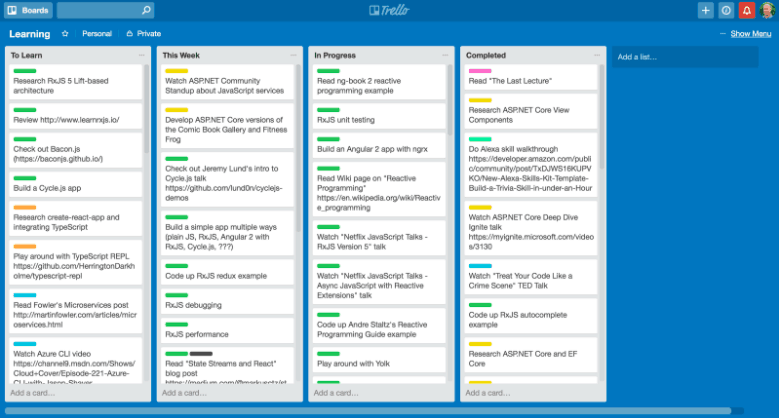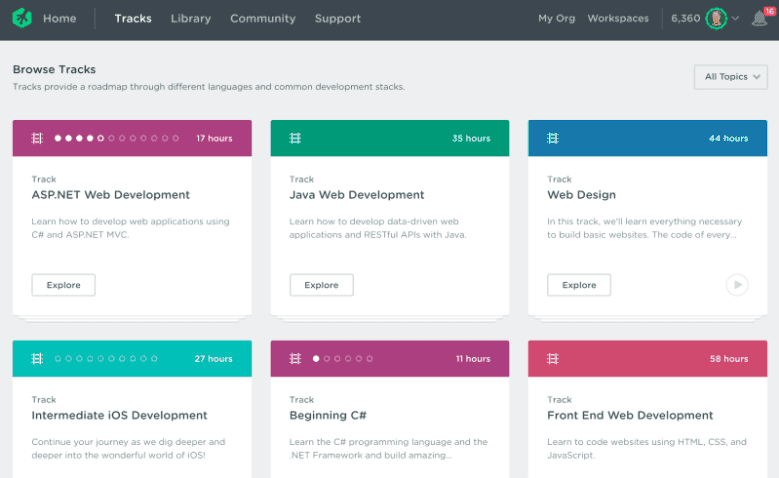As we near the end of 2017 and head into the new year, it’s important to take time for reflection. Reflecting back on the past year will help you to refine and adjust your learning efforts so that you can effectively plan and set goals for the new year.
Contents
Preparing Yourself for Reflection
When you have a journal to review, reflection can be easy to do. If you don’t, then it’ll take a little more work to create a list of your accomplishments and goals for the last year.
If you keep a calendar—whether it’s paper-based or online—review it, starting from the beginning of the year. Often, reviewing your past appointments and events will help you to recall the things that you did around those times. Also consider using other time-based online records—like source control services like GitHub or collaboration services like Slack—as a way of remembering the things that you worked on or the conversations that you had.
It’s also very common for online learning resources to have a record of what you learned. For example, if you have a Treehouse account, you can easily see a list of the badges that you earned by viewing your profile page.

Here are some of the badges that I’ve earned on Treehouse.
Once you’ve reconstructed your year, it’s time to reflect! I find it helpful to break out of my regular routine or environment. Go for a short day trip to a nearby town, visit a park, the beach, or the mountains. If you’re able to get outside, go for a walk or a bike ride, or better yet, both. Physical activity, of any kind, can help to clear your head of the kind of thoughts that occupy your mind on a daily basis.
Once you’re properly focused, you’ll be ready to effectively reflect back on the past year.
Taking an Inventory
Sometimes when you’re in a reflective mood, it’s only natural to focus on the negative. I didn’t accomplish “x” or I can’t believe that I did “y”. It’s okay to hold yourself accountable; it’s a natural part of the process. But be sure to also look for the positive.
Here are some questions that you can ask yourself:
What did I accomplish?
Celebrate your wins, no matter how small they are! A win can be virtually anything:
- What did I learn?
- What relationships did I form?
- What mistakes did I recover from?
- Are there constructive habits that I formed?
- Were there any destructive habits that I broke?
Even if you didn’t accomplish a big goal, give yourself credit for any steps that you successfully made towards a larger goal. It’s not unusual to change directions before you obtain a big goal, so be sure to recognize all of your efforts.
What didn’t work?
If you had goals that you didn’t achieve (most of us do!), then try to honestly assess why you weren’t able to achieve those goals. Don’t be too hard on yourself, but it’s important to learn from failure by making adjustments—no matter how small—to your approach.
- Was my goal clearly defined? Or was it too ambiguous?
- Was my goal realistic? Or was it too ambitious?
- Did I stay focused on my goal? Or was I distracted?
- What can I do differently next time?
Don’t hesitate to ask for advice. Ask your trusted resources if they’ve had similar experiences. What did they do to overcome these setbacks or hurdles? Can you apply any of those same techniques? Getting another point of view is incredibly valuable. It can help you to prevent making the same mistakes over and over again.
Setting Goals
After you’ve had some time to reflect back on the past year, it’s time to plan for the new year. What are your goals?
The Planning Process
Start with defining, or redefining, your big goal. What is it that you’re wanting to achieve? Sometimes, your big goal will be something that you’ll never achieve—it serves as more of a beacon. The big goal should help to give you direction as you work on defining and achieving smaller goals.
Once you have a big goal defined, work backwards from there and define progressively smaller goals. If a goal will take you longer than a week or month to accomplish, try to break it down into a set of smaller goals. Ideally, you’ll have a list of daily or weekly goals that support monthly goals, which in turn support longer term goals, and so on.
Tracking Progress
Now that you have your goals defined, don’t forget to track your progress! Weeks or months after you’ve accomplished something, it can be difficult to recall those accomplishments. Keep a journal or log your daily activities onto a calendar—paper-based or online. Or use a kanban-style board service like Trello.

Here’s a Trello board that I used to track my learning goals.
Not only can I easily see what I want to learn next, but I’m also able to review the learning tasks that I’ve completed.
Staying Motivated
No matter how much time you allocate to creating your plan, it’ll never be perfect. You’re going to encounter hurdles along the way. Let’s look at some ways that Treehouse can help.
Where do I start or what do I do next?
Is your goal to become a developer or to learn a new technology? But you’re struggling with knowing where to start or what to do next? Be sure to check out Treehouse Tracks. Tracks are a customized list of courses and workshops that provide a guided learning path for a particular subject.
Treehouse also offers Techdegree, a certification program that not only offers a guided, structured learning path, but also hands-on projects and Slack-based cohorts.
If you’re new to development and need help with picking your first programming language, be sure to check out the blog post Which Programming Language Should I Learn First?

Treehouse Tracks offer guided learning paths, making it easy to know where to start or what to do next.
Getting Help
If you ever get stuck or just need some support, check out the following Treehouse resources.
- Treehouse Community Treehouse’s Community allows you to talk with your fellow students, get your questions answered, and connect with like-minded folks going through the same journey as you are.
- Imposter Syndrome If you’ve ever struggled with Imposter Syndrome, be sure to check out this video from the team at Treehouse. You’re not alone!
- How to Learn Bonus Series The ability to learn is just like any other skill—it’s something that you can learn or learn how to do better. To that end, Treehouse has been creating a series of videos that’ll help you with learning how to learn.
Have fun with reflecting over the past year and setting goals for the new year. All of us here at Treehouse wish you the best of the luck in 2018. See you next year!
Start learning to code today with your free trial on Treehouse.








This article helps me to find myself and the direction that i will take this coming year. Thank You So Much.
Want to say thank you for your article & your works. The advices are clear & practical.
Thanks for the post. I now have a lot of choices to choose from. Thanks Again!